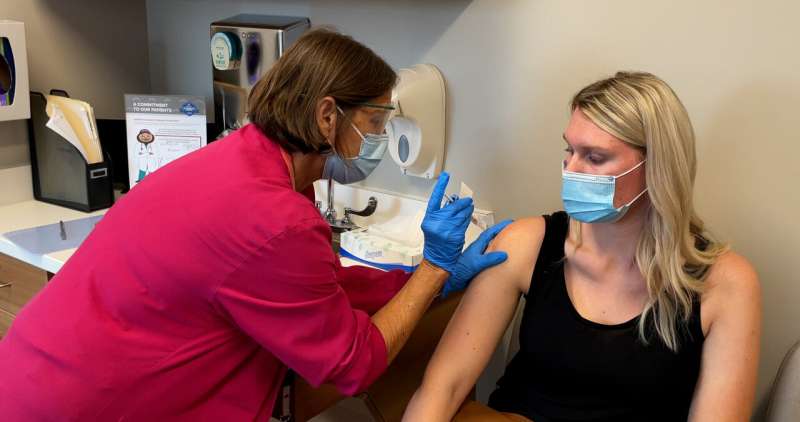

When it comes to receiving the COVID-19 vaccine, people understandably want to do their research before making a decision, especially those who are pregnant or planning to have a baby.
However, it can be extremely difficult to separate fact from fiction, especially when some information found online or on social media is intentionally deceptive. Myths and misinformation linking the vaccine to infertility or pregnancy issues are preventing many women from getting vaccinated, which puts them and their babies at risk.
Infectious disease experts at The Ohio State University Wexner Medical Center say the scientific evidence all points in one direction.
“There is absolutely no evidence to support that vaccines cause infertility or any problems during pregnancy. These are cruel rumors that prey upon the fear that a lot of women have of not being able to have children,” said Dr. Nora Colburn, an infectious disease physician at Ohio State Wexner Medical Center and an assistant professor in The Ohio State University College of Medicine.
The Centers for Disease Control and Prevention (CDC) has released data on the safety of the COVID-19 vaccines in pregnant people and recommends all people 12 years of age and older get vaccinated against COVID-19. Research shows that pregnant women who choose not to be vaccinated put themselves and their babies at risk.
“Pregnant women who become infected with COVID-19 are at much higher risk of being admitted to the ICU, needing a ventilator and dying. And any complications for mom can also be extremely dangerous for her baby,” Colburn said.
A CDC analysis of data from the v-safe pregnancy registry assessed vaccination early in pregnancy and did not find an increased risk of miscarriage among nearly 2,500 pregnant women who received an mRNA COVID-19 vaccine before 20 weeks of pregnancy, the CDC announced in August.
https://youtube.com/watch?v=XRB8Q-U1YFk%3Fcolor%3Dwhite
In addition, Colburn said there are no known long-term effects of vaccines.
“In the history of vaccines, I do not know of any long-term effects that show up after eight weeks. The phase three trials of the COVID-19 vaccines started more than 14 months ago, and there have been no effects that have been reported outside of a few weeks post-vaccination,” Colburn said.
To help sift through the mountain of content and find the facts, The Ohio State University College of Nursing’s Helene Fuld Health Trust National Institute for Evidence-based Practice in Nursing and Healthcare has launched its “Community Core,” dedicated to helping people navigate health information online to find trustworthy, evidence-based sources they can use with their care providers to make well-informed decisions.
“Many websites are created to look credible to the untrained eye, but consumers should ask themselves questions like, “Who wrote it? Who has reviewed it? How recent is the information?'” said Jacqueline Hoying, director of the Fuld Institute’s Community Core and an assistant professor of clinical nursing at the College of Nursing. “We provide resources and websites that contain trusted information that has been verified for accuracy with scientific evidence and peer-reviewed research. We also educate people about being able to look at a website and decide for themselves, “Is this accurate or not?'”
Peter Mohler, chief scientific officer of Ohio State Wexner Medical Center and vice dean for research at Ohio State College of Medicine, notes that it is always exciting to see new, creative ideas.
However, it is equally important to evaluate both the design and primary data from new studies, Mohler said, particularly when it involves research that may be used in human treatment—whether a device or a therapy.
While there are many types of research, Mohler offers these guiding themes to consider when reviewing research findings:
Source: Read Full Article